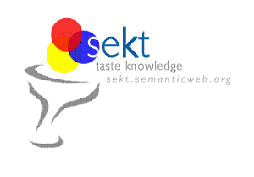|
Program Top
The schedule of the workshop can be found here.
|
Objectives Top
The intention of the workshop is to bring together
researchers from the two research areas Semantic Web and
Knowledge Discovery. According to T. Berners-Lee the
Semantic Web is "an extension of the current web in which
information is given well-defined meaning, better enabling
computers and people to work in cooperation". Current
standardization efforts include e.g. the W3C recommendation for
the Web Ontology Language (OWL). Knowledge Discovery is defined by
U.M. Fayyad as "the nontrivial process of identifying valid,
previously unknown, potentially useful patterns in data".
We foresee two ways of combining these areas. On the one hand,
mining for the semantic web includes the application of
knowledge discovery methods and techniques to support the setting
up of the semantic web itself. Prominent examples are here
ontology learning and population of ontologies (instance
learning). On the other hand, mining from the semantic
web emphasizes the usage of semantic web technologies for mining
purposes such as e.g. the usage of taxonomies in recommender
systems, applying association rules with generalizations or
clustering with background knowledge in form of ontologies.
This event is supported by


|
Topics of Interest Top
Topics of interest include but are not limited to:
Mining for the Semantic Web:
- Text-based approaches for ontology learning
- Text mining to extract metadata/ontologies
- Challenges of knowledge discovery from ontology learning perspective
- Information retrieval for the semantic web
- Information extraction with machine learning
- Web usage, content, and structure mining for discovering semantics
- Evaluation methodologies and metrics for ontology learning
- Instance mining
- Learning schema information from semi-structured information sources
- Schema mapping
Mining from the Semantic Web:
- Semantic web mining
- Multi-relational learning, inductive logic programming
- Data, web and text mining with background knowledge
- User profiling, segmentation and interpretation with background knowledge
- Schema matching
- Link and graph mining
We also encourage submissions which relate research results from
other areas (e.g., relational data mining, information retrieval,
knowledge representation) to the workshop topics.
Please do not hesitate to contact any of the Organizing Comittee members for further details.
|
Related Workshops Top
|
Workshop Organising Committee Top
|
Program Committee Top
- AnHai Doan (University of Illinois)
- Bamshad Mobasher (DePaul University, Chicago)
- Bettina Berendt (Humboldt Universitaet Berlin)
- Katia Sycara (Carnegie Mellon University, Pittsburgh)
- Kristina Lerman (ISI, University of Southern Calofirnia)
- Lyle Ungar (University of Pennsylvania)
- Marko Grobelnik (J. Stefan Institute, Ljubljana)
- Natasha Fridman Noy (Stanford Medical Informatics)
- Rudi Studer (University of Karlsruhe)
- Vipul Kashyap (Partners HealthCare Systems, Clinical Informatics R&D)
|
Submission and Proceedings Top
We invite two types of submissions for this workshop:
- Technical papers in any of the topics of
interest of the workshop (but not limited to them)
- Short position papers in any of the topics of interest of
the workshop (but not limited to them)
Submitted papers will be peer-reviewed and selected on the basis of these
reviews. Accepted papers will be presented at the workshop.
Format requirements for submissions of papers are:
- Maximum 12 pages, excluding title page and bibliography for technical papers.
- Maximum 6 pages, excluding title page and bibliography for short position papers.
- All submissions should be made electronically if possible, by email attachment and preferably in
Postscript or PDF format. Only if electronic submission is impossible should you send three hardcopies.
- All submissions must be sent to the workshop contact, Andreas Hotho at hotho@aifb.uni-karlsruhe.de
Although not required for the initial submission, we recommend to follow the format
guidelines of KDD (Springer LNCS), as this will be the required format for accepted papers
(cf. instructions).
|
Note: Please also check the list of topics in the KDD
Workshop on Web Mining and Web Usage Analysis (WebKDD).
You should consider submitting your paper to WebKDD, if the primary topics covered by the paper relate more directly to usage mining or recommendation and personalisation techniques.
Given certain amount of overlap between the topics covered by the two workshops, some of the papers submitted to each workshop will be selected for presentation at a joint session.
More details about the joint session will be posted at a later date.
|
|
Important Dates Top
- First call for papers: April, 2004
- Abstract submissions: May 26th, 2004
- Full paper submissions: May 31st, 2004
- (new) Notification of acceptance: June 29nd, 2004
- (new) Camera ready deadline: July 9th, 2004 (hard deadline)
- Workshop: August 22nd, 2004
Please do not hesitate to contact us
for any questions you have!
|


